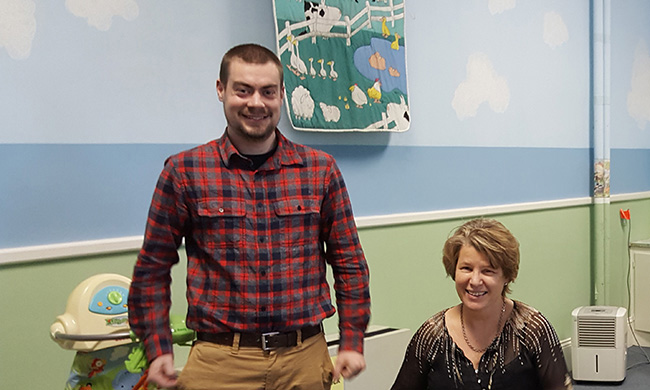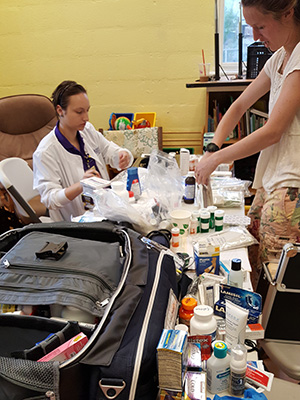Students work together to provide healthcare at homeless shelters
NewsBy: Laura Mack '16
Creative Services Student Writer

Last summer, The Healthcare for the Homeless Suitcase Clinic received an inter-professional education grant from the College of Health and Behavioral Studies to expand student involvement. For the past year, students in the nursing, physician assistant and dietetics programs have volunteered with the mobile healthcare service that provides treatment to the local homeless population. Recently, faculty and students reflected on the lessons they have learned from operating the Suitcase Clinic.
In 2009, a local homeless shelter and support center, Open Doors, reached out to Area community health nurses for help in combatting a challenging flu season. After recognizing the need for medical care in such spaces, these nurses began working with community partners. Including JMU, to create a more sustainable and comprehensive plan to expand access to healthcare at homeless shelters. PA professor Sharon Maiewski and nursing professor Tammy Kiser, along with other healthcare providers in the Harrisonburg area, have worked to improve community health for several years, growing this initiative by recruiting a full-time staff nurse and JMU student volunteers.
Today, this dedicated group rolls two large suitcases full of medical supplies to a variety of shelters on a weekly basis. Students commit to at least one semester of volunteer work “There were so many of us that were interested in helping that Sharon [Maiewski] had to randomly select ten students to participate. Luckily, I was one of the ten chosen,” said Karli Ribsam, a PA student.
At the clinic, nursing students assess the patient’s medical complaints. “After the nursing students complete the patient intake and vitals, they bring the patient to one of the PA students or our preceptor to be medically evaluated,” explained Ribsam. PA students then perform physical exams and meet with Maiewski or Kiser to come up with a diagnosis and provide treatment options from the suitcase.
The Suitcase Clinic gives students the opportunity to work collaboratively, demonstrating the larger impact they have as a group. “We hope they learn what it means to work inter-professionally and how important that communication is between providers,” said Kiser. Maiewski added that working in teams allows for multiple interpretations and potential explanations of a patient’s illness.
The CHBS grant awarded to the Suitcase Clinic expanded its volunteer base to include dietetics students, who have partnered with the Salvation Army to provide healthy food choices. “Improving food options might include getting rid of the soda machine, but students realized it wasn’t their place to tell people what to do, or to take away the little they do have,” explained Maiewski. “They were really sensitive about it, and instead came up activities that included a mindful eating session.”
Together, students must also figure out how to creatively and effectively utilize the limited resources the Suitcase Clinic is able to provide. Most of the clinic’s funding goes towards purchasing prescription medications, which quickly adds up. “Students are struck constantly by the necessity of life-saving treatments that patients don’t have the money to afford,” said Maiewski. “So, we do whatever we can to keep them out of the emergency room, which is going to cost them a whole lot more.”
As part of the CHBS grant, Kiser and Maiewski are also measuring students’ attitudes about homeless individuals before and after their semester volunteering with the Suitcase Clinic. Ribsam confirmed a greater understanding of and empathy for her patients, referencing the insight she gained just listening to their stories. “There are so many negative stigmas about the homeless population in the U.S. Although these individuals have faced hardships that I could never imagine handling, they still are so kind, and more importantly, optimistic,” she said.

While this hands-on, inter-professional project has been a success, the Suitcase Clinic is still open to collaborating with other departments that can address management issues in running the clinic. For instance, the clinic pays for taxis to referred appointments through a United Way grant, and costs for transportation to offices outside of Harrisonburg run higher than what the clinic can fund. The clinic has also found itself short-staffed in driving to pick-up and deliver medications back to the shelters. “You might think of it as a simple run to the drug store, but these patients can’t do that. They don’t just have a medicine cabinet, so it takes a whole team,” said Maiewski. Beyond transportation, the team is considering more efficient ways of managing digital patient records and establishing an online presence to publicize their services. Besides the clinician side, there are opportunities for students with social work, advertising or business backgrounds to brainstorm creative solutions.
As students and faculty alike have learned the limitations on what they are able to provide from just two heavy suitcases, they are passionately addressing and looking to improve access to healthcare in Harrisonburg. This small, but dedicated team works tirelessly to provide care to those who might go untreated if it were not for the Suitcase Clinic.

